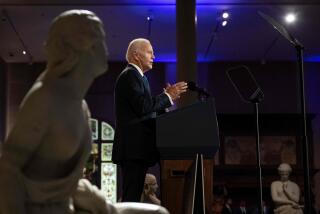WASHINGTON INSIGHT
SUMMIT ACCORD? Prospects appear to be diminishing sharply that President Bush will face serious opposition from other Western leaders in his efforts to limit the amount of economic aid to the Soviet Union that emerges from the London summit next week. Although U.S. officials had feared earlier that some countries might push for massive Western aid to the Soviets, strategists say all the allies now are convinced that cash grants and loans should be kept to a minimum. While Germany has asserted that it will press hard at the summit for substantial economic aid to Moscow, U.S. officials believe Bonn has trimmed its sails.
The likely outcome: The seven summit participants will agree to provide technical assistance and some credits, but only on a step-by-step basis--pegged to Moscow’s willingness to make reforms in the Soviet economy. Also likely: associate status for the Soviets in the International Monetary Fund.
DESERT STORM CLOUDS: President Bush faces a political quandary over the possibility that the United States might have to take military action to prod Iraqi President Saddam Hussein into allowing United Nations inspectors to examine his nuclear weapons facilities.
Administration officials say Bush is serious in his threat that the United States will use military force if necessary to back up Western demands, but they concede that the step is fraught with perils--both political and military. Political strategists see a possible backlash if the United States has to send troops back into the region in the wake of Bush’s decision to pull out of Iraq last spring rather than completely crush the Iraqi military. And the Administration itself is divided internally. Pentagon planners in particular are unenthusiastic about the prospect--partly because the Iraqi nuclear material is easily concealed and is constantly being shuttled from place to place, making it difficult to target.
U.S. military officers privately fear a replay of the 1989 Panama operation, when they carried out a futile--and embarrassing--four-day manhunt for elusive dictator Manuel A. Noriega, who finally tired and turned himself in to the Vatican’s representative. “The longer it goes on, the harder it is,” a senior Pentagon official says of the cat-and-mouse game with the Iraqis.
COMPROMISE LOST? Bush’s nomination of Clarence Thomas to the U.S. Supreme Court may inadvertently reduce Senate pressure on the White House to reach a compromise with Congress over the long-pending civil rights bill, Capitol Hill strategists predict.
Hill sources say the appointment has smoothed relations between the Administration and Sen. John C. Danforth (R-Mo.), for whom Thomas worked as a staffer both in the Missouri attorney general’s office and on Capitol Hill. Danforth, who had lobbied hard to have Thomas named to the high court, had been spearheading a bipartisan effort to hammer out an accord that would save the civil rights bill from a veto. But congressional strategists say he is expected to abandon all efforts to rescue the legislation--and will not hold a grudge against the President. “A fortuitous unintended consequence,” an Administration strategist gloats.
GUESS WHO’S COMING TO DINNER--AGAIN? Soviet President Mikhail S. Gorbachev has been so pleased over his invitation to have lunch with President Bush and to meet with other Western leaders at the London economic summit that he is reportedly vying for a second invitation: He wants to meet with top Western officials at the next annual meeting of the North Atlantic Treaty Organization, to be held this autumn in Rome.
More to Read
Get the L.A. Times Politics newsletter
Deeply reported insights into legislation, politics and policy from Sacramento, Washington and beyond. In your inbox three times per week.
You may occasionally receive promotional content from the Los Angeles Times.







